As the number of COVID-19 cases continues to rise globally, health experts are focusing their efforts on containing the disease and mitigating the damage that it has done so far. Public health measures are being implemented to slow down the outbreak and save countless lives. Besides this, it’s important to remember that public health responsibility extends to individuals too, and the burden shouldn’t just rest on organizations. Here’s what you can do to help curb the spread of COVID-19:
Strengthen your immune system

Strengthening your immune system is one way to combat getting sick, either from COVID-19 or any other illness. The following are some things you can implement in your daily routine:
Maintain a healthy diet and lifestyle. This is something you always need to do, not just now. Load your diet up with fruits, vegetables, and whole fiber. If you want to go the extra mile, you could sign up for fitness coach training classes in order to gain the skills, knowledge, and tools to sustain a healthy diet and lifestyle. You can also extend your expertise to advise other individuals how to take care of their own well-being, especially now when people most need it.
Manage your stress levels. It might seem impossible to do at this very moment, but it’s important to lessen your stress in order to boost your immune system. Stress causes your body to release cortisol which reduces the number of antibodies in your immune system that fights against pathogens. While you shouldn’t completely disregard the news, it’s recommended that you take mental health breaks every once in a while. Meditating, doing breathing exercises, and taking regular walks can also help clear your mind. Get an adequate amount of sleep and don’t panic.
At the moment, it’s especially important to keep yourself healthy so that you don’t add to the already overwhelming load that the healthcare system is dealing with. One less patient to treat, regardless of whether it’s for COVID-19 or any other illness, gives way for health professionals to treat more serious cases of the outbreak.
Practice proper hygiene etiquette
Whether you’re out running errands or stuck at home, it’s important to practice proper hygiene etiquette. Wash your hands properly and wash them often. Make sure you’re scrubbing them for at least 20 seconds with soap and water. Afterwards, avoid touching your face, especially your eyes, nose, and mouth. If you need to cough or sneeze, do so in the crick of your elbow or into a tissue (which you should properly dispose of afterwards). Never cough or sneeze into your hand. If you do, be sure to wash them immediately.
Practice social distancing
Social distancing involves avoiding situations that increase physical space between a group of people. This means avoiding going out for nonessential tasks, cancelling events that draw crowds, working from home arrangements, communicating with loved ones through electronic devices rather than in person, and switching to online classes.
Avoid spreading misinformation
It’s important to keep people informed about developments, but always be sure to check your sources when sharing news. See to it that they come from verified news outlets, pay attention to spelling errors and the overall quality of the report, and make sure that you’re not reading an older story that’s being taken out of context. Misinformation can cause panic, stress, and may even result in people breaking quarantine or social distancing efforts.
Take care of yourself and others by following these helpful tips. Don’t panic and remember that you’re not alone in these trying times.



